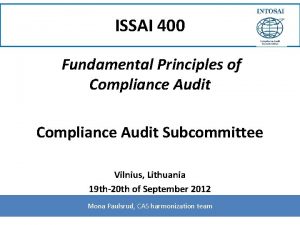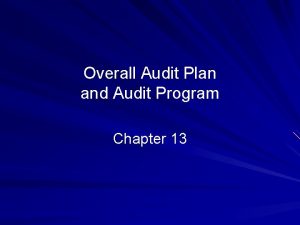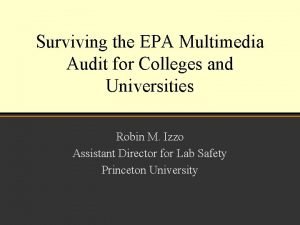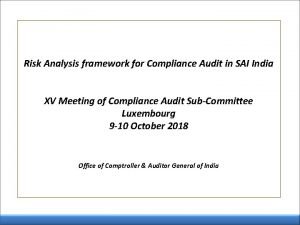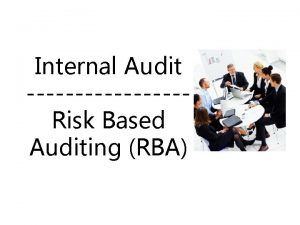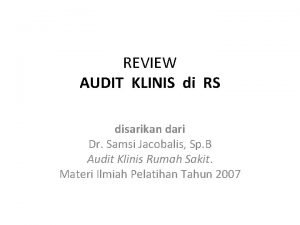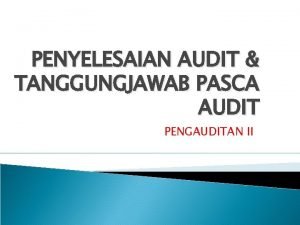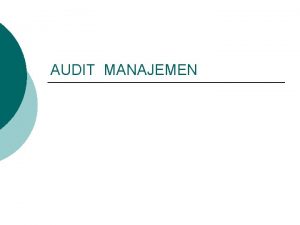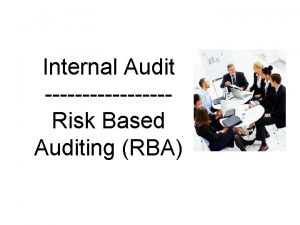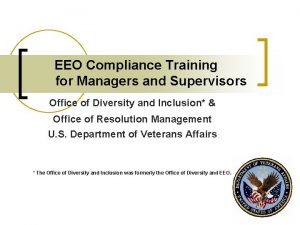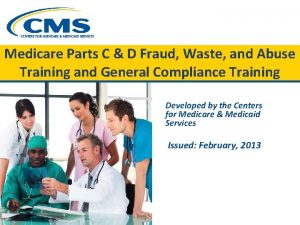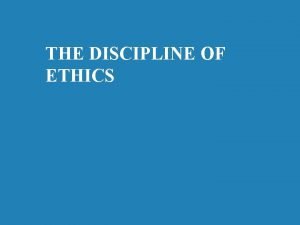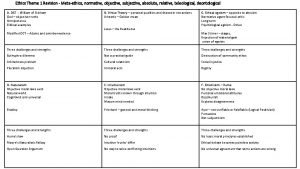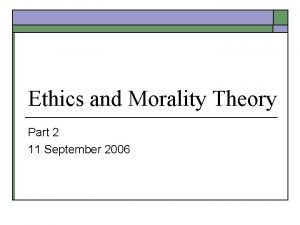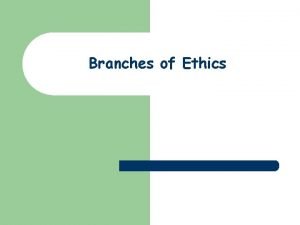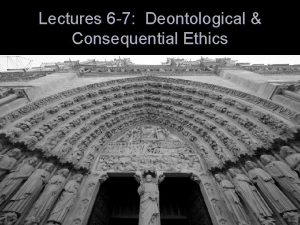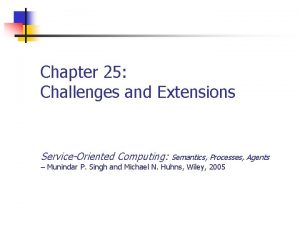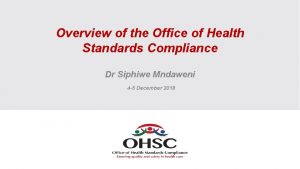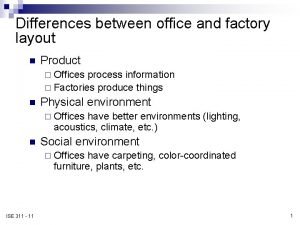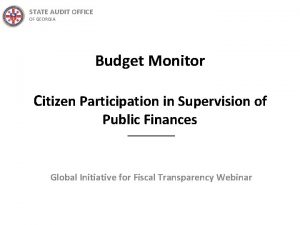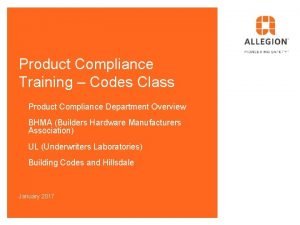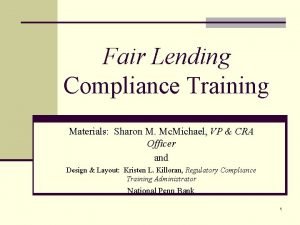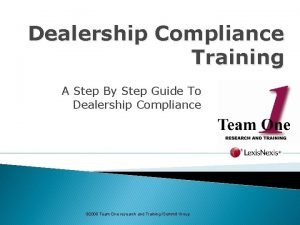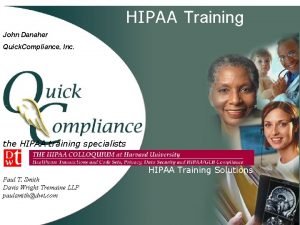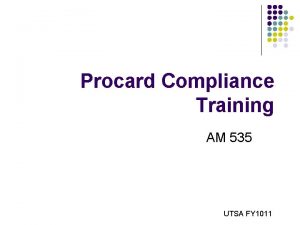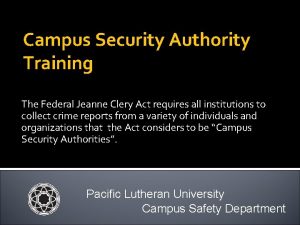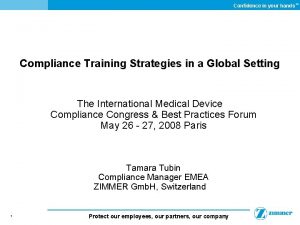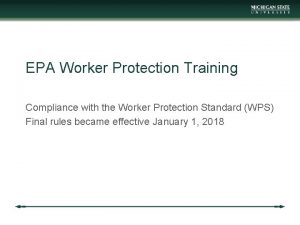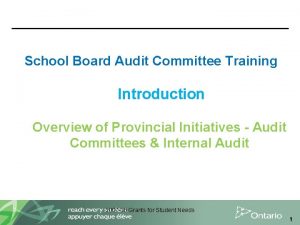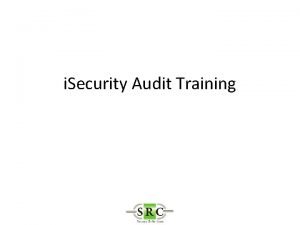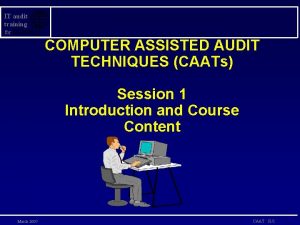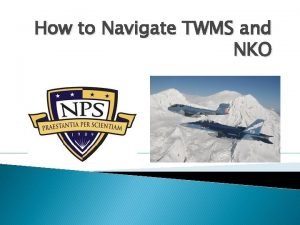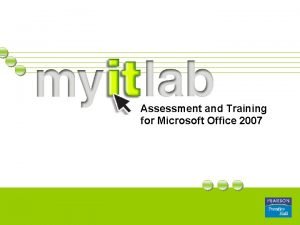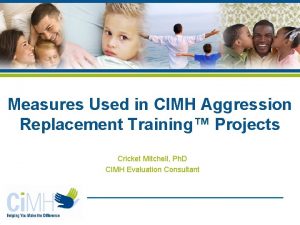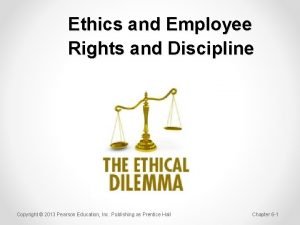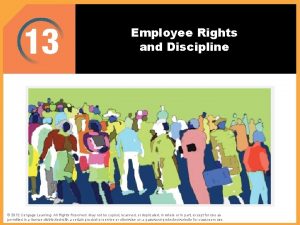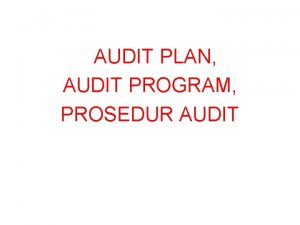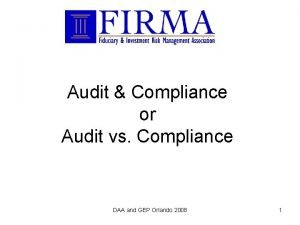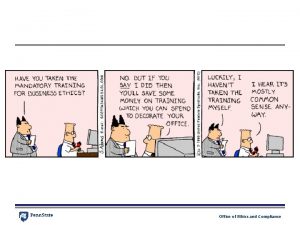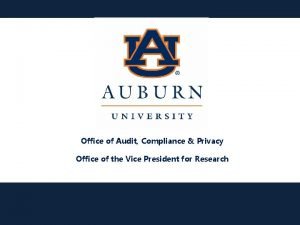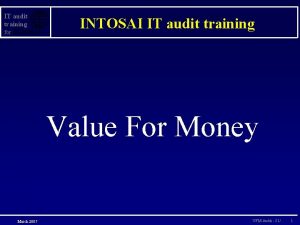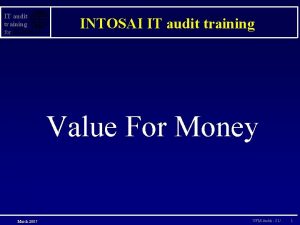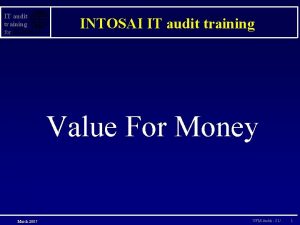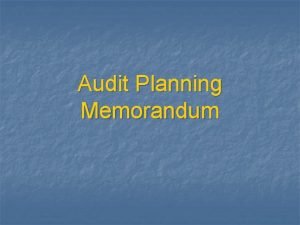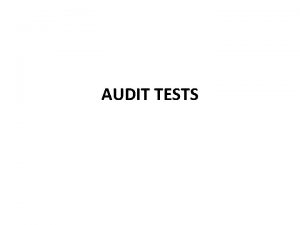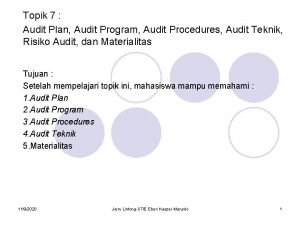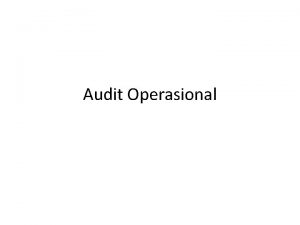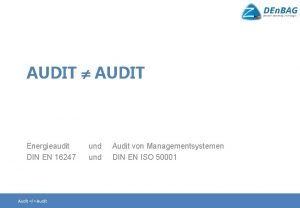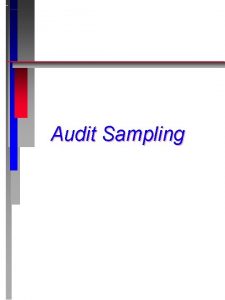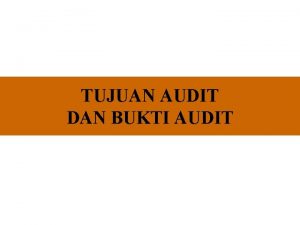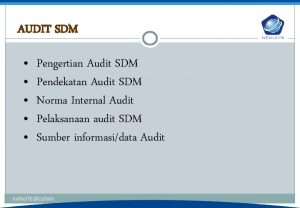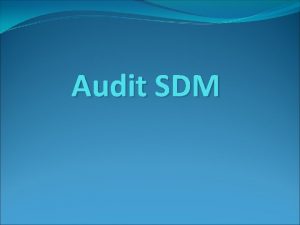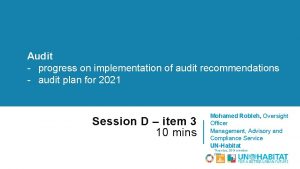Compliance and Ethics Training Office of Audit Compliance




















































- Slides: 52

Compliance and Ethics Training Office of Audit, Compliance and Ethics

compliance and ethics training Welcome to Compliance and Ethics Training Compliance education is required annually by federal, state, University of Connecticut and UConn Health mandates. As you complete this training, click on the links to view additional information or to locate applicable University or UConn Health policies. For training questions contact: Ginny Pack 860 -679 -1280 pack@uchc. edu

UNIVERSITY OF CONNECTICUT CODE OF CONDUCT individual responsibility institutional success

code of conduct Why do we have a Code of Conduct? The Code publicly outlines standards of workplace behavior expected of all members of the University/UConn Health community. It affirms each employee’s responsibility to contribute to the University’s compliance with laws, regulations and policies. Certain UConn Health policies, such as the Rules of Conduct support the Code’s values and principles. Your conduct should always reflect the University’s core values which are knowledge, honesty, integrity, respect, and professionalism. Employees are expected to act in a professional, courteous, respectful manner and to carry out their responsibilities with the utmost integrity. Read Policies: Code of Conduct Rules of Conduct

UConn Health Policy Prevention of Workplace Violence Employees, students, volunteers, vendors, visitors and others who work in locations under the UConn Health umbrella have an obligation to uphold the policy to prevent workplace violence. Incidents of violence that create a risk to anyone must be reported to UConn Health Police immediately. Read Policy: Workplace Violence Prevention Policy Refer to Form: Workplace Violence Incident Report Form

equity in education and healthcare equal opportunity and the prevention of discrimination, harassment and interpersonal violence

education and healthcare equity Introduction Title IX of the Education Amendments of 1972 is a comprehensive federal law that prohibits discrimination on the basis of sex in any federally funded education program or activity. The law also provides individuals protection against such discriminatory practices. The Department of Health and Human Services’ (DHHS) Nondiscrimination in Health Programs and Activities rule implements Section 1557 of the Affordable Care Act (ACA). This is the first federal civil rights law to broadly prohibit discrimination in federally funded health programs. The rule prohibits discrimination on the basis of race, color, national origin, sex, age or disability in certain health programs and activities.

title IX University Policy UConn is committed to creating and maintaining a campus environment free from all forms of sexual harassment, sexual violence, intimate partner violence and stalking. Approved by the Board of Trustees, the University-wide policy against discrimination, harassment and interpersonal violence applies to all University campuses, including UConn Health. This policy addresses sexual and gender-based harassment, sexual assault, sexual exploitation, intimate partner violence, stalking, complicity, and retaliation. The policy also prohibits certain amorous relationships where power disparities are present. Read Policy: University of Connecticut Policy Against Discrimination, Harassment, and Related Interpersonal Violence

university policy Reporting Obligations Virtually all University employees must report incidents of sexual assault, intimate partner violence and stalking to the Office of Institutional Equity (OIE). Deans, Directors, Department Heads and Supervisors must also report any discrimination, harassment or inappropriate amorous relationships to OIE. Failure to report any known incidents as required by the University’s Policy Against Discrimination, Harassment and Related Interpersonal Violence is a violation. Retaliation against any individual who, in good faith, reports or who participates in the investigation of alleged violations is strictly prohibited.

university policy Amorous Relationships between Faculty/Staff and Undergraduate Students • Faculty and staff are prohibited from pursuing or engaging in an amorous relationship with any undergraduate student. Relationships between Faculty/Staff and Medical/Dental/Graduate Students • Faculty and staff are prohibited from pursuing or engaging in an amorous relationship with a graduate student actually under that individual’s authority. • “Authority” includes teaching, formal mentoring or advising, supervision of research, employment, grading, or disciplinary action. Relationships between Supervisors and Subordinates • Faculty and staff are prohibited from pursuing or engaging in an amorous relationship with employees whom they currently supervise.

university policy Sexual or Intimate Partner Violence and Stalking Essentially, all employees are considered “responsible employees. ” This means when a student discloses or you receive a report of: Sexual Assault Stalking Intimate Partner Violence Report to OIE If you witness a sexual assault and/or an incident of intimate partner violence or stalking, call 911 immediately. You should then contact OIE. For information, assistance and resources: Sexual Assault, Intimate Partner Violence and Stalking Awareness Website

university policy Sexual or Intimate Partner Violence and Stalking Safety is the highest priority. You are strongly encouraged to call 911 and/or UConn Health Police with any health or safety concerns. Your report to OIE should include: • Date, time and location of the assault. • Details known to you about the assault. • Date the incident was reported to you. • Identity of the victim and perpetrator (if disclosed or known). • Your identity and contact information. Office of Institutional Equity � 16 Munson Road, 4 th floor � 860 -679 -3563 � equity@uconn. edu �

university policy Sexual or Intimate Partner Violence and Stalking Remember, in addition to the obligation that all employees must report disclosures of sexual assault, intimate partner violence and stalking involving students, Deans, Directors, Department Heads, and Supervisors are required to report to OIE any possible violations of the Policy Against Discrimination, Harassment and Related Interpersonal Violence that involve any UConn employee such as: • discrimination. • harassment. • inappropriate amorous relationships. For more information: UConn Health Sexual Assault, Intimate Partner Violence and Stalking Reporting and Resources Brochure

university policy Service and Emotional Support Animals on Campus Under the Americans with Disabilities Act (ADA), service animals are allowed on the UConn Health campus or in areas owned or controlled by UConn Health to assist individuals with disabilities. Members of the University community may not interfere with a service animal or its duties. Employees must contact the Human Resources in advance of reporting for work with an animal.

university policy Service and Emotional Support Animals on Campus Patients and visitors may bring service animals to any non-restricted campus area without advanced approval. In certain restricted clinical settings, prior authorization by appropriate clinical administrators may be needed for Refer to: service animals. Emotional support animals may accompany patients to any area only with advanced manager permission. UConn: Animals on Campus UConn Health Clinical Practice Procedures Regarding Animals

ACA non-discrimination Non-discrimination under the Affordable Care Act ACA Section 1557 Civil Rights Act Race, color, national origin Rehabilitation Act Disability HIV/AIDS status Age Discrimination Act Title IX Sex Gender identity and sex stereotyping

ACA non-discrimination Definition of sex discrimination Under the Nondiscrimination in Health Programs and Activities rule, sex discrimination includes, but is not limited to, discrimination based upon: • an individual’s sex. • pregnancy, childbirth, related medical conditions, pregnancy termination. • gender identity. • sex stereotypes. The rule provides explicit protections for: • lesbian, gay and bisexual (LGB) individuals on the basis of sex stereotypes. • transgender individuals and gender minorities on the basis of gender identity.

ACA non-discrimination Meaningful access to health programs Entities must provide effective language assistance services to individuals with limited English proficiency (LEP), in a timely manner and free of charge. Qualified interpreters must be offered when oral interpretation is a reasonable step to provide meaningful access to health programs. Taglines (short statements in non-English languages) to notify individuals of the availability of language assistance services must be included in an entity’s significant publications and posted in prominent locations, including its website. Read Policy: Interpreters/Linguistic Access for Persons with Limited English Proficiency Consistent with principles of civil rights law, the rule prohibits segregation, delay or denial of services or benefits based on an individual’s race, color or national origin.

ACA non-discrimination Meaningful Access to Health Programs Buildings in which health programs or activities are conducted are subject to the Accessibility Standards for Buildings and Facilities under the ACA. Standards include, among other requirements, signage to be posted at inaccessible entrances directing individuals to an accessible entrance location. Entities must use the International Symbol of Accessibility.

ACA non-discrimination Auxiliary Aids & Services Auxiliary aids and services must be provided, including: • Qualified sign language interpreters. • Captioning. • Large print materials. • Screen reader software. • Text telephones (TTYs). • Video remote interpreting services. Entities must ensure that communications with individuals with disabilities are as effective as communications with others. .

ACA non-discrimination Effective communication UConn Health must ensure effective communication with patients and their companions who are deaf or hard of hearing related to all aspects of the patient’s care. Responsible staff members must: • assess each individual’s specific needs to determine the type of aid or service that may be necessary, considering the expressed preference of the patient and/or companion. • document the determination in the medical record and patient registration system. • reassess and document the effectiveness of the auxiliary aid or service. Individuals who may have contact with patients or others that are deaf or hard of hearing should review the UConn Health policy. Read Policy: Effective Communication with Individuals Who Are Deaf or Hard of Hearing

university policy Non-discrimination Statements Publications describing or inviting participation in UConn programs or activities must contain a non-discrimination statement as part of our commitment to equal opportunity and access to the University’s health and other programs/activities. Departments producing applicable publications must incorporate the required non-discrimination statement into existing, revised and new material. Event-specific publications must include an accessibility statement to ensure the opportunity for participants with disabilities to request accommodations and fully participate in events or activities. For questions related to University non-discrimination, Affirmative Action and Equal Employment Opportunities policies and reasonable accommodations contact: Office of Institutional Equity 860 -679 -3563 equity@uconn. edu Refer to: Non-Discrimination Policy Statements for Publications

preventing fraud, waste and abuse

fraud, waste and abuse Introduction Fraud, waste and abuse cost institutions as well as state and federal governments millions of dollars each year. As UConn Health employees, we have a collective responsibility to minimize waste, avoid abuse of valuable UConn Health and state resources and, particularly, to prevent actions that would constitute fraud.

fraud, waste and abuse What is Waste? Waste is defined as a misuse of resources or practices that result in needless expenditures of UConn Health, state and/or federal funds. It often stems from individuals being uninformed, careless, or from poor decisions. Examples of waste include: • Purchasing unneeded equipment or supplies. • Purchasing goods at inflated prices. • Replacing equipment unnecessarily or failing to recycle equipment appropriately.

fraud, waste and abuse What is Abuse? Abuse is defined as the improper use of funds, resources or authority that results in higher costs to UConn Health or to the state and federal governments. Examples of abuse include: • Misusing paid time or manipulating expense reimbursements. • Using your state position or authority for personal financial gain. • Accepting gifts or favors for awarding contracts to vendors.

fraud, waste and abuse Preventing waste and abuse Waste can be prevented by avoiding purchases or other practices that unnecessarily consume time, money or resources. Purchasing and contract decisions should be made only by individuals with adequate information and appropriate authority. Abuse can be prevented by using UConn Health/state time, personnel and resources appropriately and only for business purposes. If it’s not related to your UConn Health job responsibilities, it is not an appropriate use of state resources.

fraud, waste and abuse Protecting UConn Health Assets All UConn Health employees must safeguard the State’s property and assets with which they are entrusted. Asset control is a partnership between employees, managers and the Office of Logistics Management (OLM). Lack of accountability results in damaging publicity, negative audit findings, reputational harm, and potential loss of funding.

fraud, waste and abuse Asset Control: Manager Accountability Department Heads are accountable for all assets listed as belonging to their respective departments. • Managers must ensure that appropriate Inventory Control Forms are submitted to OLM when assets are moved, transferred, disposed of, lost, or damaged and collaborate with OLM to reconcile asset lists as soon as they are received. Staff should assist OLM to locate their departments’ assets during each physical inventory. A list of all assets that are not located will be returned to the department for investigation. • Remember to submit the applicable Inventory Control Form to OLM before disposing of any asset. Even if you no longer have the asset, it will remain assigned to your department on the official asset list. You will continue to be responsible for the asset until OLM receives the completed form

fraud, waste and abuse Asset Control: OLM Role OLM is responsible for: • Tagging capital and controllable assets when they are received by UConn Health. Note: In situations where items do not pass through the receiving dock, departments must notify OLM. • Scanning asset tags on equipment located in each department during the physical inventory. • Maintaining and updating UConn Health’s official asset list based on physical inventory results and Inventory Control forms submitted by departments throughout the year. Refer to: Asset Control Procedures

fraud, waste and abuse Using electronic equipment appropriately Employees are provided electronic resources to enable faculty, students and staff to accomplish work that is part of UConn Health’s mission. Electronic, computing and networking equipment and software including UConn Health email must be used for UConn Health business purposes only. Read Policy: Information Technology Computer/Electronic Resource Use Policy Refer to: Acceptable Use of State Systems

fraud, waste and abuse Travel and Entertainment Travel to conferences and other events related to one’s official UConn Health responsibilities or hosting guests/candidates is an important part of furthering the reputation of UConn Health and enhancing the productivity of its workforce. However, similar to the management of other UConn Health and state assets, it is important that workforce members practice fiscal, ethical and public responsibility by respecting and safeguarding travel privileges and related funds. Refer to new policy: Travel and Entertainment

fraud, waste and abuse What is Fraud? Fraud is an intentional misrepresentation of information for unauthorized financial gain or to derive some other benefit. Examples of fraud include: • Falsifying a time report or credentials. • Offering, soliciting or receiving a bribe or kickback. • Diverting cash, equipment or supplies. • Altering an accounting record or supporting documents. • Deliberate misstatements or omissions on financial statements. • Identity theft.

fraud, waste and abuse The Who, What, When, and Why of Fraud Who commits fraud? • Anyone is capable as long as there is a means, a motive and an opportunity. What circumstances contribute to fraud? • Situations motivated by internal and external pressures such as financial stress, performance expectations, or even well-meaning institutional goals. When does fraud occur? • Whenever an opportunity exists where there are weakened internal controls, breakdowns in processes, confusing practices or lack of definitive process “owners. ” Why does fraud happen? • Improper actions that occur as a one-time event may escalate and, over time, become justified in the eyes of the individual or entity.

fraud, waste and abuse The more serious the offense, the greater the heat… Waste Results from errors, inefficiencies, knowledge deficit, policy or procedural weaknesses. Abuse Results from “bending the rules”, ignoring established policies and procedures, misusing resources. Fraud Involves the intent to deceive for personal or financial gain.

fraud, waste and abuse Fraud prevention begins with you To minimize the opportunity for fraud at UConn Health, employees and managers must follow established policies and appropriate departmental procedures: Avoid short cuts or other practices that compromise processes. Assume responsibility only for activities for which you are authorized. Ask questions or seek guidance if you are unclear or uncomfortable with a task or responsibility. Managers have a responsibility to prevent fraud by delegating responsibilities appropriately, answering questions, providing appropriate guidance and oversight of department processes, ensuring proper checks and balances with established processes and correcting procedural weaknesses.

fraud, waste and abuse Recognizing Fraud Prevention of fraud begins with recognizing signs of possible deception such as: • missing or altered documentation of transactions or financial statements. • unreconciled inventory discrepancies or shortages. • unusual or improper bidding or contract negotiation processes. • situations in which required business processes are bypassed.

fraud, waste and abuse What are the laws related to fraud and abuse? Click on each item for more information: • Anti-kickback Statute • Physician Self-Referral Law (Stark) • Criminal Health Care Fraud Statute • Exclusion Statute • Federal and Connecticut False Claims Acts

fraud, waste and abuse Fraud and abuse laws Anti-Kickback Statute Federal statute that prohibits knowingly and willfully offering, paying, soliciting or receiving anything of value to induce or reward referrals for items or services reimbursed by a Federal health care program. Certain “safe harbors” exist but their use must be carefully reviewed.

fraud, waste and abuse Fraud and abuse laws Physician Self-referral Law (Stark) Federal statute that prohibits a physician from making a referral for certain “designated health services” (DHS) to an entity in which the physician or an immediate family member has an ownership/investment interest or a compensation arrangement. There are certain Stark exceptions that may be considered only after careful review. For more information regarding Stark and Anti-kickback, refer to UConn Health Stark and Anti-kickback Compliance policy.

fraud, waste and abuse Fraud and abuse laws Criminal Health Care Fraud Statute Federal statute that prohibits knowingly and willfully executing or attempting to execute a scheme to defraud any health care benefit program or obtain, under false pretenses, money or property of any health care benefit program. Proof of actual knowledge or specific intent to violate the law is not required.

fraud, waste and abuse Fraud and abuse laws Exclusion Statute Exclusion from participation in federal healthcare programs is mandatory for any provider or supplier convicted of Medicare fraud or other Medicarerelated offenses as well as patient abuse/neglect, theft/financial misconduct or unlawful conduct associated with controlled substances. Exclusion presents both individual and institutional liability. Claims submitted for services by a provider whom UConn Health knows or should have known is excluded may result in significant institutional penalties. Criminal background and Federal sanctions checks prior to employment or the initiation of a contract and regularly thereafter are essential. Refer to the UConn Health Background and Sanctions Checks policy.

fraud, waste and abuse Fraud and abuse laws Federal and State False Claims Acts Federal law: Imposes civil and criminal liability on any person who knowingly submits or causes to be submitted a fraudulent claim to the government. “Knowingly” includes ignoring facts that may reveal false information or disregarding the need to verify information related to a claim. Connecticut law: Imposes liability on individuals and corporations who knowingly submit false claims to any state-administered health or human services program.

fraud, waste and abuse Fraud Prevention: Provider relationships To avoid violations of Stark and Anti-kickback laws, when considering working with or investing in any business, providers should ask questions such as: • Am I being offered an investment interest for a nominal capital contribution? • Is the venture promising high rates of return for little or no financial risk? • Am I being asked to guarantee referrals or orders of supplies as part of the contract? • Will I be more likely to either refer patients or refer more patients to the venture as a result of this relationship?

fraud, waste and abuse Penalties for Violations of any federal or state statutes may result in civil monetary penalties, fines, imprisonment, or the exclusion of an individual/entity from participation in Federal healthcare programs. Penalties for violations of the False Claims Act rose again in 2017 and now range from $10, 957 to $21, 916 per claim. Rising penalties make compliance with applicable laws and UConn Health policies more important than ever!

fraud, waste and abuse Fraud Prevention: Documentation and Coding In order to reduce the risk of fraud, waste and abuse, accurate documentation is crucial including: � Determining medical necessity in a given encounter. � Avoiding upcoding or undercoding services. � Choosing the correct level of Evaluation and Management (E & M) service. � Appropriately documenting split/shared E & M services. � Documenting intern/resident/fellow supervision correctly by the teaching physician. � Assigning DRGs appropriately. � Using modifiers appropriately (e. g. Modifiers 25 and 59). � Documenting accurately in the electronic health record (EHR) (e. g. when using copy and paste to bring documentation forward).

fraud, waste and abuse Professional Services Documentation and Coding Assistance Janice Mc. Donnell Compliance Specialist 860 -679 -4093 jmcdonnell@uchc. edu Melissa Bracone Coding Trainer 860 -679 -2946 bracone@uchc. edu Marcie Hamel Coding Trainer 860 -679 -2038 hamel@uchc. edu Katalin Kerekes Coding Trainer 860 -679 -5493 kerekes@uchc. edu Katherine Rudolewicz Coding Trainer 860 -679 -5471 rudolewicz@uchc. edu

fraud, waste and abuse Reporting Fraud If you notice questionable activity or signs of potential fraud, report your concerns immediately to: Your supervisor � The Compliance Office 860 -679 -4180 compliance. officer@uchc. edu � Anonymously to: REPORTLINE at 888 -685 -2637 � Employees also have the option to report concerns of potential fraud to: • State Auditors of Public Accounts 860 -240 -5300 or 800 -797 -1702 ctauditors@cga. ct. gov • UConn Health strictly prohibits retaliation against individuals who, in good faith, report a compliance issue. • For more information: Non-Retaliation policy.

fraud, waste and abuse Additional Resources For more information: � Department of Health and Human Services/Department of Justice: Stop Medicare Fraud Department of Health and Human Services/Centers for Medicare and Medicaid: Avoiding Medicare Fraud & Abuse: A Roadmap For Physicians � University-wide policy: Prevention and Reporting of Fraud and Fiscal Irregularities �

Office of Audit, Compliance and Ethics The Compliance Office staff is here to help Iris Mauriello Compliance Integrity and Privacy Officer 860 -679 -3501 mauriello@uchc. edu Ginny Pack Associate Compliance Officer 860 -679 -1280 pack@uchc. edu Kim Bailot Associate Compliance Officer 860 -679 -4746 kbailot@uchc. edu Shannon Kelmelis Administrative Officer 860 -679 -4180 kelmelis@uchc. edu Margaret De. Meo Associate Compliance Officer 860 -679 -1226 demeo@uchc. edu Michelle Mendocha Administrative Coordinator 860 -679 -4177 mendocha@uchc. edu

Our thanks to the following for their assistance and contributions: Shannon Kelmelis Michelle Mendocha Elizabeth Conklin

Thank you for completing Compliance and Ethics Training! Please complete the training acknowledgment. Training Questions? Contact the Compliance Office 860 -679 -4180 or Ginny Pack 860 -679 -1280 pack@uchc. edu
 Issai 4200
Issai 4200 Meaning of auditing
Meaning of auditing Overall audit plan
Overall audit plan Macroethics definition
Macroethics definition Tsca
Tsca Pengertian compliance audit
Pengertian compliance audit Perbedaan audit konvensional dengan audit berbasis risiko
Perbedaan audit konvensional dengan audit berbasis risiko Audit rekam medis adalah
Audit rekam medis adalah Beda audit medis dan audit klinis
Beda audit medis dan audit klinis Penyelesaian audit dan tanggung jawab pasca audit
Penyelesaian audit dan tanggung jawab pasca audit Konsep dasar audit
Konsep dasar audit Prosedur audit bottom-up dan audit top-down
Prosedur audit bottom-up dan audit top-down Perbedaan audit konvensional dengan audit berbasis risiko
Perbedaan audit konvensional dengan audit berbasis risiko Audit word derived from
Audit word derived from Audit universe vs audit plan
Audit universe vs audit plan Eeoc training for managers
Eeoc training for managers Compliance training for managers
Compliance training for managers Medicare parts c and d general compliance training answers
Medicare parts c and d general compliance training answers Descriptive ethics
Descriptive ethics Normative ethical questions
Normative ethical questions Factual inquiry in ethics
Factual inquiry in ethics Meta ethics vs normative ethics
Meta ethics vs normative ethics Descriptive ethics vs normative ethics
Descriptive ethics vs normative ethics Discipline
Discipline Meta ethics vs normative ethics
Meta ethics vs normative ethics Main branches of ethics
Main branches of ethics Deontological ethics examples
Deontological ethics examples Teleological ethics vs deontological ethics
Teleological ethics vs deontological ethics Office of health standards compliance
Office of health standards compliance Factory office layout
Factory office layout Swedish national audit office
Swedish national audit office Budget monitor georgia
Budget monitor georgia China national audit office
China national audit office The office business ethics
The office business ethics Product compliance training
Product compliance training Fair lending compliance training
Fair lending compliance training Dealership compliance training
Dealership compliance training Board of directors compliance training
Board of directors compliance training Danaher connect compliance training
Danaher connect compliance training Utsa compliance training
Utsa compliance training Plu campus safety
Plu campus safety Compliance training strategies
Compliance training strategies Epa compliance training
Epa compliance training Audit committee training
Audit committee training As400 journal entry types
As400 journal entry types Computer aided audit tools
Computer aided audit tools Twms training
Twms training Office 2007 training
Office 2007 training Training is expensive without training it is more expensive
Training is expensive without training it is more expensive Metode of the job training
Metode of the job training Aggression replacement training facilitator training
Aggression replacement training facilitator training Ethical discipline in the workplace
Ethical discipline in the workplace Ethics and employee rights and discipline
Ethics and employee rights and discipline
